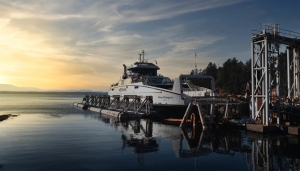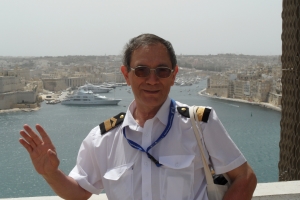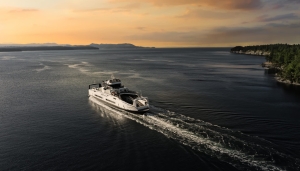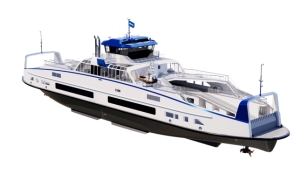Damen Shipyards comprehensively electrifies ferry connections in Canada

 By Marek Grzybowski
By Marek Grzybowski
Damen Shipyards won the contract to supply car ferries to British Columbia. Damen, which also operates in Poland, will build four electric passenger and car ferries for the Canadian operator BC Ferries. Damen will also provide facilities for charging ferries from land.
– Damen is implementing this type of contract for the fourth time. In 2021, it performed a similar contract for the first time in Canada, informs the management of Damen Shipyards. The charging system was used to operate two Damen hybrid ferries ordered by the Ministry of Transport in Ontario. Subsequently, projects were implemented in Copenhagen, Denmark and Dordrecht, the Netherlands.
Damen Shipyards management emphasizes that the contract was won “in a competitive bidding process that attracted many international bidders.” Damen Shipyards Group has been awarded a contract to build and deliver four fully electric passenger and car ferries for BC Ferries.
“The new hybrid electric ships will further unify our fleet, both increasing capacity and improving our flexibility to move ships on different routes, so our passengers can be confident that we will get them where they want to go,” said Nicolas Jimenez, BC Ferries President and CEO.
Jimenez will emphasize that “Adding more Island-class ships will also reduce crew levels, reduce training costs and promote safe, reliable and environmentally friendly coastal ferry services.”


Canadian local content lost to Romania
– Damen, the same shipyard that built six previous Island class ferries for BC Ferries, is based in the Netherlands and will build the ships in Romania. Its offer was selected from several proposals for the execution of the contract that came from all over the world. No Canadian company submitted an offer, emphasizes BC Ferries management.
BC Ferries, in a statement to the Canadian administration, community and media, said that “in 2022 it issued a ‘Request for Prequalification’ which qualified a number of shipyards for the ‘Request for Proposal’ stage.” In the lead-up to this process, BC Ferries informed Canadian shipyards of the upcoming tender through forums such as the Canadian Ferry Association, the Association of British Columbia Marine Industries and at other local and national industry events. Canadian shipyards were invited to participate in the tender.
This is an excuse for the situation that occurred years ago when Remontowa won the contract for a series of ferries with LNG systems, and politicians, media and shipyard representatives attacked the operator for not signing contracts with local producers of ships and ship equipment.
The ferries will provide short-sea services in the waters of the Canadian province of British Columbia (BC). – This order brings the total number of ferries Damen has delivered to BC Ferries in recent years to ten. However, these latest models will be the first to operate using 100% electricity, Damen emphasizes.
The contracted units are design 8117 E3 double-sided RoRo units developed by Damen. Each of them will be able to take on board up to 47 vehicles and 390 passengers. Electricity for the drive systems will be supplied by batteries with a capacity of 2,000. kW.
Fast charging
Fast charging using renewable energy will take place while mooring. There will be enough time to recharge the batteries as passengers disembark from the ferry and board and change vehicles. Auxiliary diesel engines will also be installed on each vessel to ensure safe cruising.
“We are very excited and extremely pleased to have awarded BC Ferries the contract for four more Island Class ships,” said Leo Postma, Damen’s regional director for the Americas.
Postma recalled: “We have been working with BC Ferries technical staff for seven years and together we have developed a total of a very efficient series of 10 ferries that meet all future requirements for safe, reliable and sustainable public water transport.
BC Ferries said four new ships will enter service by 2027 on routes connecting Nanaimo Harbor and Gabriola Island (two ships) and Campbell River and Quadra Island (two ships). Under a separate agreement, BC Ferries will also undertake the appropriate modernization of electrical installations for fast charging from shore in four terminals on the routes on which the ordered ferries will operate. The modernization of onshore electrical systems will be carried out before the ships are delivered.
The introduction of electric ferries to connections in British Columbia is the result of a change in the decarbonization concept by the British Columbia government. Previously, the modernization of the fleet was based on ships with gas-powered engines. As a result, BC Ferries in Remontowa rebuilt and built a series of ferries with LNG systems developed in the Remontowa Group. In Gdańsk, the Canadian ferry operator BC Ferries implemented the “Clean Futures Plan” by building four “Salish” series ferries on the Motława River.
Remontowa Shipbuilding created ferries with sonorous names: Salish Orca (handed over in November 2016), Salish Eagle (in February 2017) and Salish Raven (in April 2017), Salish Heron (in December 2021). Spirit units were also rebuilt in Remontowa. Spirit of Vancouver and Spirit of British Columbia are equipped with gas-powered engines. According to the shipowner, introducing the units to the service (MG in 2019) could reduce the operator’s emissions by up to 12.5 thousand. tons of CO2 per year.
